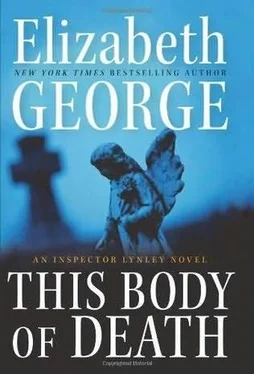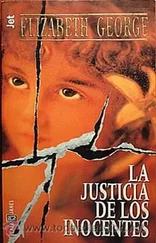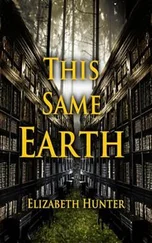Lynley went on. “So my suggestion is that you tell me whatever seems relevant. Why did she come to see you?”
Yolanda continued silent for a moment. She seemed to be tossing round the ramifications of speaking or not speaking. She finally said, “I told the others already: love. It’s why they usually come.”
“Love for whom?”
Again a hesitation before she said, “The Irishman. The one who works at the ice rink.”
“Frazer Chaplin?”
“She wanted to know what they always want to know.” Yolanda moved restlessly on the sofa. She reached for an ashtray beneath it and stubbed out her cigarette. She said, “I told the others that, more or less. The black man and the woman with the teeth. I don’t see how going over it all again with you is going to make a difference.”
Lynley gave passing wry thought to how Barbara Havers would react to being called “the woman with the teeth.” He let the thought go. He said, “Call it a new perspective: mine. What, exactly, did you tell her?”
She sighed. “Love’s risky.”
Isn’t it just, Lynley thought.
“I mean as a topic,” she went on. “One can’t make predictions about it. There’re too many variables, always the unexpected bits, especially if one doesn’t have the other person there to…well, to scrutinise, you see. So one keeps things vague, in a manner of speaking. That’s what I did.”
“To keep the client coming back, I should guess.”
She glanced his way, as if to evaluate his tone. He kept his face impassive. She said, “This is a business. I don’t deny it. But it’s also a service that I provide and, believe me, people need it. ’Sides, all sorts of things come up when I’m engaged with a client. They come to see me for one reason, but they find others. ’S not me keeping them coming back, I can tell you that. It’s what I know. It’s what I tell them that I know.”
“And Jemima?”
“What about her?”
“She had other reasons, beyond her questions about love?”
“She had.”
“And what were those?”
Yolanda sat up. She swung her legs round. They were chunky, without ankles, a single plane from her knees to her feet. She plopped her hands down on either side of her thighs as if for balance, and while she held herself straight, her head was lowered. She shook this.
Lynley thought she meant to refuse, no more information, sir. But instead, she said, “Something’s standing between me and the others. Everything’s gone quiet. But I intended no harm. I didn’t know.”
Lynley felt strongly disinclined to play along. He said, “Mrs. Price, if you know something, I must insist-”
“Yolanda!” she said, her head rising with a jerk. “It’s Yolanda in here. I’m having enough trouble with the spirit world as it is, and I don’t need someone in this room reminding them I’ve another life out there, d’you understand that? Ever since she died-ever since I was told that she died-it’s gone quiet and dark. I’m going through the motions, I’ve been doing that for days, and I don’t know what I’m failing to see.” Then she rose. The room was dim and gloomy, likely in keeping with her line of work, and she went to the curtained entry where she switched on an overhead light. The illumination brought the dismal little space into unforgiving relief: dust on the furniture, slut’s wool in the corners, secondhand belongings that were chipped and cracked. Yolanda paced the small area. Lynley waited although his patience was wearing thin.
She finally said, “They come for advice. I try not to give it directly. That’s not how it works. But in her case, I could feel something more and I needed to know what it was in order to work with her. She had information that would have helped me, but she didn’t want to part with it.”
“Information about whom? About what?”
“Who’s to tell? She wouldn’t say. But she asked where she should meet someone if hard truths had to be spoken between them and if she feared to speak them.”
“A man?”
“She wouldn’t tell me that. I said the obvious, what anyone would say: She must choose a public place for her meeting.”
“Did you mention-”
“I did not tell her that cemetery.” She stopped her pacing. She was on the other side of the table and she faced him across it, as if she needed the safety of this distance. She said, “Why would I tell her that cemetery?”
“I take it you didn’t recommend her local Starbucks either,” Lynley pointed out.
“I said choose a place where peace predominates and where she could feel it. I don’t know why she chose that cemetery. I don’t know how she even knew about it.” She resumed her pacing. Round the table once, twice, before she said, “I should have told her something else. I should have seen. Or felt. But I didn’t tell her to stay away from that place because I didn’t see danger.” She swung round on him. “Do you know what it means that I didn’t see danger, Mr. Lynley? Do you understand the position that puts me in? I’ve never doubted the gift for a moment, but now I do. I don’t know truth from lies. I can’t see them. And if I couldn’t protect her from danger, I can’t protect anyone.”
She sounded so wretched that Lynley felt a surprising twinge of compassion although he did not for a moment believe in psychic phenomena. The thought of protecting someone, however, made him think of the stone Jemima was carrying. A talisman, a good luck charm? He said, “Did you try to protect her?”
“Of course I did.”
“Did you give her anything to keep her safe prior to this meeting she intended to have?”
But she hadn’t. She had sought to protect Jemima Hastings only with words of advice-“vague mutterings and imaginings,” Lynley thought-and they’d been useless.
At least, however, they now knew what Jemima had been doing in Abney Park Cemetery. On the other hand, they had only Yolanda’s word for what she herself had been doing in Oxford Road that day. He asked her about this; he also asked her what she’d been doing at the time of Jemima’s death. To the latter she said she’d been doing what she was always doing: meeting with clients. She had the appointment book to prove it and if he wanted to phone them he was welcome to do so. As to the former, she’d already said: She was attempting to purify the bloody house before someone else met death unexpectedly. “McHaggis, Frazer, the Italian,” she said.
Did Yolanda know them all? Lynley asked her.
By sight if not by acquaintance. McHaggis and Frazer she’d spoken to. The Italian, not.
And did she have occasion to open any of the recycling bins in the garden? he enquired.
She looked at him as if he were mad. Why the bloody hell would she open the bins? she asked. The bins don’t need purifying, but that house does.
He didn’t want to go down that road again. He reckoned he’d got all there was to be had from Yolanda the Psychic. Until the spirit world revealed more to her, she seemed like a closed book to him.
WHEN ROBBIE HASTINGS PULLED ONTO GORDON JOSSIE’S holding, he wasn’t sure what he intended to do, for Jossie had lied to him not only about wanting to remain with Jemima, but also-as things turned out-about when he’d last seen her. Rob had had this latter piece of information from Meredith Powell, and it was a phone call from her that had sent him to Jossie’s property. She’d been to see the police in Lyndhurst; she’d given them proof positive that Gordon had traveled into London on the morning of Jemima’s death. He’d even stayed the night in a hotel, she told Rob, and she’d given the police that information as well.
“But, Rob,” she had said and through his mobile he could hear anxiety in her voice, “I think we’ve made a mistake.”
Читать дальше












